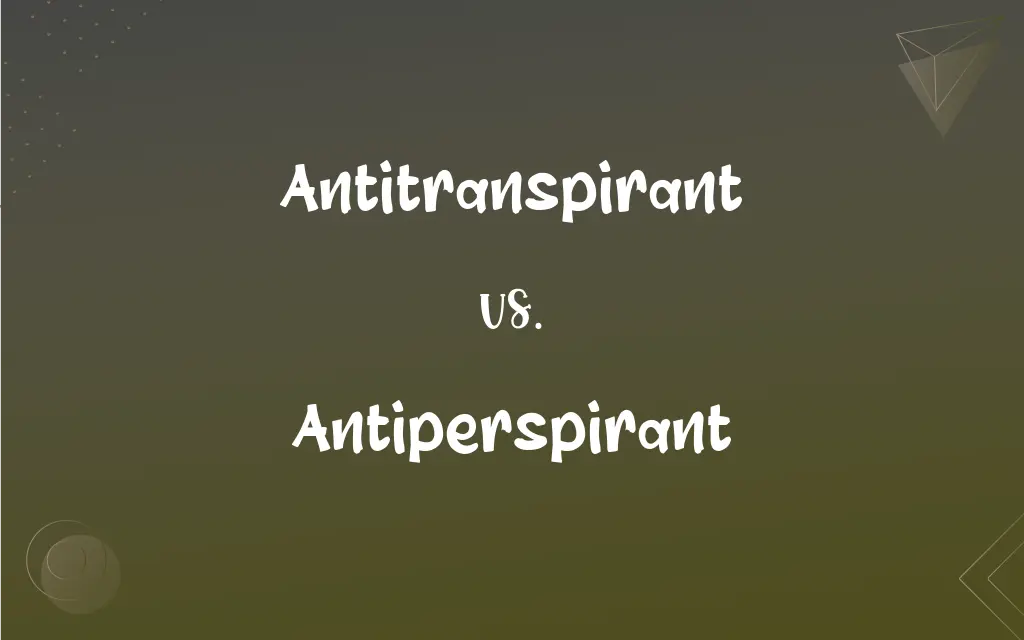Antitranspirant vs. Antiperspirant: What's the Difference?
By Aimie Carlson & Janet White || Updated on May 23, 2024
Antitranspirant reduces water loss in plants by forming a protective coating, while antiperspirant reduces human perspiration by blocking sweat glands.

Key Differences
Antitranspirant is a substance applied to plants to reduce water loss by creating a protective film over the leaves. This helps plants conserve water, especially during drought conditions. On the other hand, antiperspirant is a personal care product used to reduce sweating in humans by blocking the sweat glands, providing dryness and odor control.
Antitranspirant works by forming a barrier on the plant's surface, which minimizes transpiration and helps retain moisture within the plant. This is particularly useful in agriculture and gardening during hot, dry weather. Conversely, antiperspirants contain active ingredients like aluminum compounds that temporarily block sweat ducts, reducing the amount of sweat reaching the skin surface.
While antitranspirants benefit plants by maintaining hydration and preventing stress from water deficiency, antiperspirants provide comfort to people by keeping their underarms dry and odor-free. The mechanisms of action differ significantly between the two, as antitranspirants interact with plant physiology, whereas antiperspirants interact with human sweat glands.
Antitranspirants can be synthetic or natural substances and are usually sprayed onto plant foliage. They are used in horticulture to protect plants from dehydration. In contrast, antiperspirants are typically formulated as roll-ons, sprays, or sticks for personal hygiene use, ensuring dryness and freshness for hours.
Comparison Chart
Purpose
Reduces water loss in plants
Reduces sweating in humans
ADVERTISEMENT
Mechanism
Forms protective film over plant leaves
Blocks sweat glands with active ingredients
Use
Applied to plant foliage
Applied to human skin, particularly underarms
Typical Ingredients
Synthetic or natural substances
Aluminum compounds and other active agents
Application Method
Sprayed onto plants
Roll-ons, sprays, or sticks for personal hygiene
Antitranspirant and Antiperspirant Definitions
Antitranspirant
Used to form a protective coating over plant surfaces.
Antitranspirants are essential during droughts.
ADVERTISEMENT
Antiperspirant
Blocks sweat glands to control sweating.
Antiperspirants are effective in managing excessive sweating.
Antitranspirant
A substance that reduces water loss in plants.
The gardener applied an antitranspirant to the leaves to conserve moisture.
Antiperspirant
A product that reduces human perspiration.
She used antiperspirant to stay dry all day.
Antitranspirant
Reduces transpiration rates.
The antitranspirant reduced the transpiration rates significantly.
Antiperspirant
Often contains aluminum compounds.
The new antiperspirant has a gentle formula with aluminum chloride.
Antitranspirant
Helps maintain plant hydration.
Using an antitranspirant, the farmer saved the crops during the dry season.
Antiperspirant
Used for personal hygiene to reduce body odor.
He always applies antiperspirant after his morning shower.
Antitranspirant
Protects plants from dehydration.
Spraying antitranspirant protected the roses from wilting.
Antiperspirant
Provides dryness and freshness.
The antiperspirant kept him fresh throughout his workout.
Antitranspirant
Reducing transpiration in plants.
Antiperspirant
An astringent preparation applied to the skin to decrease perspiration.
Antitranspirant
A substance applied to plant leaves to reduce transpiration.
Antiperspirant
A substance used to minimize sweating or perspiration, and usually applied to the underarm area.
Antiperspirant
An astringent substance applied to the skin to reduce perspiration
FAQs
How does an antiperspirant work?
It contains active ingredients like aluminum compounds that block sweat ducts, reducing sweat production.
How does an antitranspirant work?
It forms a barrier on the plant's surface to minimize transpiration and retain moisture.
What is an antiperspirant?
An antiperspirant is a personal care product designed to reduce sweating by blocking sweat glands.
What are common ingredients in antiperspirants?
Aluminum compounds like aluminum chloride or aluminum zirconium.
Why use an antitranspirant on plants?
To help plants conserve water and prevent dehydration, especially during droughts.
Are antiperspirants safe for daily use?
Yes, antiperspirants are generally safe for daily use as directed.
Do antitranspirants affect plant growth?
They primarily help in conserving water and do not negatively impact plant growth.
What is an antitranspirant?
An antitranspirant is a substance used to reduce water loss in plants by forming a protective coating over their leaves.
Why use an antiperspirant?
To stay dry and reduce body odor, especially in the underarm area.
What are common ingredients in antitranspirants?
Synthetic or natural substances that form a protective film on leaves.
Can antiperspirants cause skin irritation?
Some people may experience skin irritation; choosing a gentle formula can help.
Can antitranspirants harm plants?
When used correctly, antitranspirants do not harm plants and can be beneficial during water stress.
Are there natural antiperspirants?
Yes, some products use natural ingredients to reduce sweating.
Can antitranspirants be washed off?
Yes, rain or irrigation can wash off antitranspirants, reducing their effectiveness.
Do antiperspirants stop sweating completely?
They significantly reduce sweating but do not stop it completely.
When should you apply an antitranspirant?
Before periods of expected drought or high heat to conserve plant moisture.
Can antitranspirants be used on all plants?
Most plants can benefit from antitranspirants, especially during dry periods.
When should you apply an antiperspirant?
After bathing and before any activity that may cause sweating.
Are there natural antitranspirants?
Yes, some natural oils and substances can act as antitranspirants.
Can antiperspirants be washed off?
Yes, antiperspirants can be washed off with soap and water.
About Author
Written by
Aimie CarlsonAimie Carlson, holding a master's degree in English literature, is a fervent English language enthusiast. She lends her writing talents to Difference Wiki, a prominent website that specializes in comparisons, offering readers insightful analyses that both captivate and inform.
Co-written by
Janet WhiteJanet White has been an esteemed writer and blogger for Difference Wiki. Holding a Master's degree in Science and Medical Journalism from the prestigious Boston University, she has consistently demonstrated her expertise and passion for her field. When she's not immersed in her work, Janet relishes her time exercising, delving into a good book, and cherishing moments with friends and family.































































